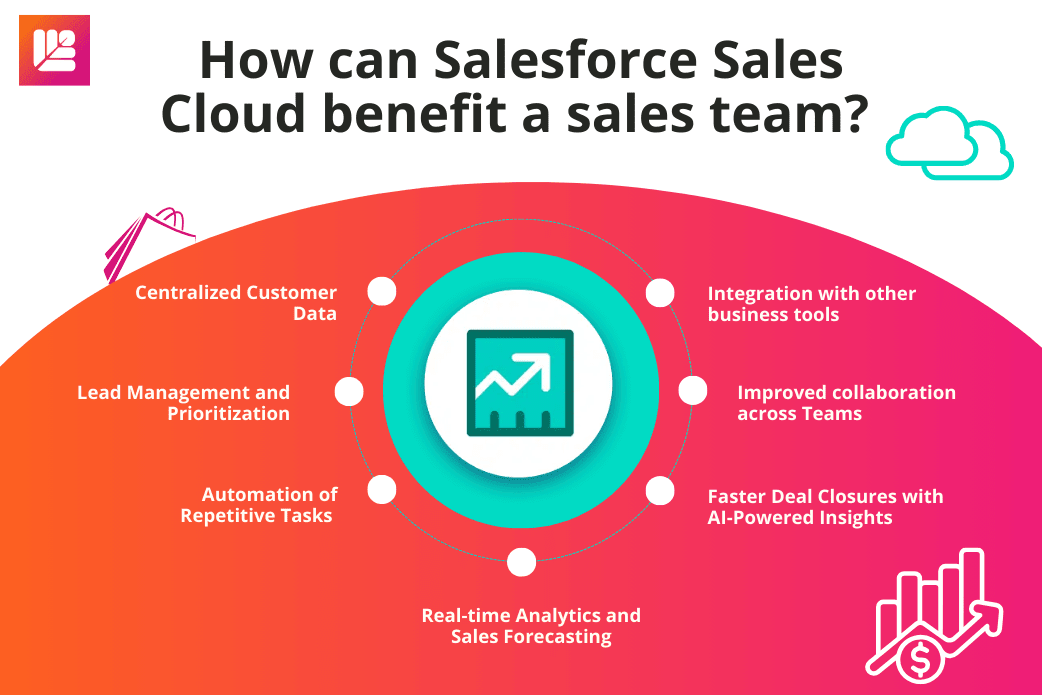Sales teams face increasing pressure to close deals faster, manage leads efficiently, and forecast revenue with accuracy. Traditional methods often involve scattered customer data, manual processes, and limited visibility into sales pipelines. Salesforce Sales Cloud addresses these challenges by offering a centralized platform for managing customer relationships, automating sales processes, and improving decision-making through data-driven insights.
If you’re a sales representative tired of spending more time updating records than closing deals or a manager struggling to get a clear view of team performance, this blog explores how Sales Cloud supports sales teams, helping them move prospects through the pipeline efficiently while maintaining a strong focus on customer interactions
Let’s break down what Sales Cloud is, why it’s essential, and how it can make life easier for sales teams.
What is Salesforce Sales Cloud? A Quick Overview
Simply put, Salesforce Sales Cloud is a powerful customer relationship management (CRM) platform built to help sales teams sell smarter and faster. It is a central hub where all your customer data, sales opportunities, tasks, and insights are stored in one place. Instead of sifting through emails and notes, everything you need is right at your fingertips. Sales Cloud is packed with smart tools like AI-driven insights, automation, and real-time analytics that help teams prioritize leads, track progress, and close deals efficiently.
Why sales teams need Salesforce Sales Cloud?
Let’s be honest: sales is hard enough without outdated processes slowing you down. If your team is still using manual spreadsheets, losing track of follow-ups, or struggling to forecast revenue, here’s why Sales Cloud can be a smart move:
1. All your customer data in one place
Forget digging through emails and notes, Sales Cloud keeps everything organized so you can focus on selling, not searching.
2. Smart Automation for repetitive tasks
Follow-up emails, reminders, and data entry? Hand it over to Sales Cloud so your team can focus on closing deals.
3. Clear, Data-Driven Decisions
No more guesswork, Sales Cloud gives you real-time insights to track performance and forecast sales accurately.
4. Better Lead Management
Know which leads are worth pursuing and which ones need more nurturing with intelligent lead-scoring tools.
For a closer look at top functionalities, check out the Top 15 Features of Salesforce Sales Cloud.
How can Salesforce Sales Cloud benefit a sales team?
Now, let’s dive into the core benefits of Salesforce Sales Cloud and how it transforms sales teams into high-performing units.

1. Centralized Customer Data
Sales Cloud provides a 360-degree view of customer information, including:
- Contact details and past interactions
- Purchase history
- Open opportunities and pipeline status
Having all data in one place helps sales teams personalize outreach and follow-ups, leading to stronger relationships with prospects and customers.
2. Lead Management and Prioritization
Sales Cloud simplifies lead tracking and qualification by:
- Capturing leads from emails, websites, and social media
- Assigning scores based on engagement and likelihood to convert
- Automating follow-ups for high-priority leads
By focusing on the most promising opportunities, sales teams can increase conversion rates and shorten sales cycles.
3. Automation of Repetitive Tasks
Manual administrative work takes up valuable time. Sales Cloud automates:
- Follow-up emails and reminders
- Data entry and lead assignments
- Approval workflows for quotes and proposals
Reducing time spent on routine tasks allows sales teams to focus on building relationships and closing deals.
4. Real-time Analytics and Sales Forecasting
Sales Cloud provides accurate sales forecasts using real-time data and AI-driven insights. Key features include:
- Custom dashboards to track sales performance
- Pipeline visibility to identify potential roadblocks
- Predictive forecasting based on historical trends
Sales managers can make informed decisions, improve resource allocation, and set realistic targets.
5. Faster Deal Closures with AI-Powered Insights
Sales Cloud’s Einstein AI helps sales teams close deals more quickly by offering:
- Recommendations on the next best action
- Automated email and call reminders
- AI-generated insights based on past deals
This allows sales teams to engage prospects at the right time with the right messaging.
6. Improved Collaboration Across Teams
Sales success often depends on collaboration between sales, marketing, and customer support. Sales Cloud helps teams to:
- Share real-time updates on deals and customer interactions
- Access key information across departments
- Avoid duplicate efforts by maintaining a single source of truth
This improves coordination and offers a smooth customer experience from the first touchpoint to post-sale engagement.
7. Mobile Access for Sales Teams
With Sales Cloud Mobile, sales reps can:
- Access leads and accounts from anywhere
- Log calls, emails, and notes instantly
- Receive notifications for deal updates
This flexibility allows sales teams to stay productive whether they are in the office or meeting clients.
8. Integration with Other Business Tools
Sales Cloud connects with various third-party applications, including:
- Marketing automation platforms
- Enterprise resource planning (ERP) systems
- E-commerce solutions
A connected ecosystem helps sales teams work efficiently without switching between multiple platforms.
How to use Salesforce Sales Cloud effectively
Salesforce Sales Cloud is more than just a CRM, it’s a powerful platform that helps sales teams organize data, track leads, and close deals efficiently. However, simply adopting Sales Cloud isn’t enough, its real impact depends on how well it is used. A structured approach to managing leads, contacts, and accounts, combined with an optimized sales process, can make all the difference in improving sales performance.
Here’s a step-by-step breakdown of how sales teams can make the most of Salesforce Sales Cloud.
1. Capturing, Qualifying, and Converting Leads
Lead management is the foundation of any successful sales strategy. Salesforce Sales Cloud provides tools to capture leads, assess their potential, and move them through the sales funnel efficiently.
- Capturing Leads: Leads can enter the system through multiple sources, such as website forms, email inquiries, social media, or manual entry by sales reps. Sales Cloud automatically records and categorizes these leads, reducing the risk of lost opportunities.
- Qualifying Leads: Not all leads are worth pursuing. Sales Cloud’s lead scoring feature assigns values based on engagement, company size, and likelihood to convert. Sales teams can prioritize leads with higher scores and focus on those most likely to turn into paying customers.
- Converting Leads: Once a lead is ready, Sales Cloud allows conversion into Contacts and Accounts while preserving all past interactions. This avoids duplicate data entry and maintains a consistent sales history.
2. Structuring the Sales Process
A well-defined sales process ensures that every opportunity moves through the pipeline with a clear direction. Sales Cloud allows businesses to set up a structured sales workflow that aligns with their unique business model.
- Defining Sales Stages: Sales teams can customize pipeline stages to reflect their selling process, whether it’s Initial Contact, Qualification, Proposal, Negotiation, or Closed-Won. This visibility helps reps know exactly where each deal stands.
- Automating Approval Workflows: Many sales processes require managerial approvals for discounts, contract changes, or custom deals. Sales Cloud automates these approvals, reducing delays and keeping deals moving forward.
- Data Accuracy with Validation Rules: Inconsistent data entry can create confusion. Sales Cloud allows businesses to set validation rules that enforce correct formatting, required fields, and standardized entries to maintain a clean database.
3. Managing Leads, Contacts, and Accounts
Salesforce categorizes customer data into Leads, Contacts, and Accounts. Understanding how to use each effectively ensures that sales teams have a structured approach to managing relationships.
Lead Management
- Use automated lead capture from emails, social media, and marketing campaigns.
- Apply lead scoring to prioritize the most promising prospects.
- Convert qualified leads into Contacts and Accounts without losing historical data.
Contact Management
- Store complete customer profiles, including email history, call logs, and interactions.
- Use task reminders and follow-up scheduling to stay in touch with prospects.
- Segment contacts based on preferences, past purchases, or engagement history.
Account Management
- Organize businesses and organizations under Accounts for a clearer sales structure.
- Link multiple Contacts under a single Account to track decision-makers and influencers.
- Monitor sales performance at an account level, tracking deals and revenue generated.
Want to learn more about Salesforce Sales Cloud implementation? Read our detailed guide on Salesforce Sales Cloud Implementation: A Complete Overview.
4. Using AI and Automation for Smarter Selling
Sales Cloud goes beyond basic data management by incorporating AI-powered insights and automation, helping sales teams make informed decisions and reduce manual work.
AI-Powered Deal Predictions: Sales Cloud’s Einstein AI analyzes past sales data to predict which opportunities have the highest chance of closing, allowing reps to focus on the most promising deals.
Automated Task Management: Routine tasks such as follow-up emails, meeting reminders, and data updates can be automated, freeing up time for sales reps to focus on selling.
Intelligent Lead Routing: Leads can be automatically assigned to the right sales reps based on geography, industry, or product interest, ensuring faster response times.
5. Integrating Sales Cloud with Other Business Tools
Salesforce Sales Cloud becomes even more powerful when connected with other essential business applications.
Marketing Integration: Sync with marketing platforms like Pardot or HubSpot for better lead nurturing and personalized campaigns.
ERP & Finance Systems: Connect with ERP software to track sales revenue, invoices, and contract management.
Mobile Access: Sales reps can access Sales Cloud on their mobile devices, ensuring they can update records, follow up on leads, and close deals while on the go.
Real-world use cases: How Industries Use Sales Cloud for Growth
Salesforce Sales Cloud is widely adopted across industries, each using it in unique ways to drive sales and improve efficiency.
1. Technology & SaaS Companies
Tech companies deal with long sales cycles, multiple stakeholders, and recurring revenue models. Sales Cloud helps them:
- Automate lead qualification and customer onboarding.
- Track subscription renewals and upsell opportunities.
- Use AI insights to identify expansion possibilities within existing account.
2. Manufacturing & Industrial Sales
Manufacturers manage complex sales operations involving distributors, wholesalers, and direct clients. Sales Cloud assists them in:
- Tracking bulk orders and managing distributor relationships.
- Integrating sales data with inventory and supply chain systems.
- Automating follow-ups for reorders and contract renewals.
3. Financial Services & Banking
Banks and financial institutions require strict compliance tracking and relationship management. Sales Cloud helps them:
- Manage client portfolios and investment opportunities in a centralized dashboard.
- Automate client communication for loan follow-ups and financial planning.
- Use predictive analytics to assess lending risk and customer lifetime value.
4. Retail & E-Commerce
Retailers use Sales Cloud to build personalized customer relationships and boost sales performance. Key benefits include:
- Centralized customer purchase history and preferences.
- AI-driven product recommendations for personalized sales strategies.
- Automated loyalty program tracking and targeted promotions.
Wrapping Up
Sales success depends on structure, efficiency, and the ability to make informed decisions. Salesforce Sales Cloud provides sales teams with the tools they need to organize leads, manage customer relationships, and track performance, all within a single platform. With automation handling routine tasks and AI offering data-driven insights, teams can focus on selling rather than administrative work.
For businesses aiming to refine their sales strategy, the right approach to implementation is key. Working with a Salesforce Partner like Melonleaf Consulting can help organizations make the most of Sales Cloud, aligning it with their sales processes. The right combination of technology and expertise can create a sales engine that drives long-term growth and success.












